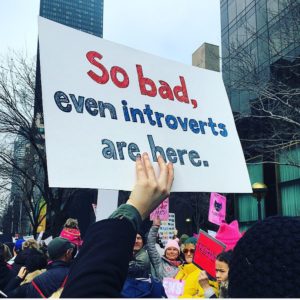
2,316 words | 10 min. read
[dropcap]T[/dropcap]hanks the combo of parent + full-time employed person + I’m no longer crazy enough to go without sleep, my processing speed is like that of one of those old putty-colored, 128k Macintoshes, circa the mid-1980s. So! The notes below are what I finally compiled from last weekend, i.e. the post-inaugural one, as opposed from this past weekend, i.e. the most recent one following our first week of the bull-in-the-china-shop attempted coup d’état (and if you need any convincing on that score, read Yonatan Zunger in Medium, thank you Kelly Wickham Hurst).
Last weekend I attended the National Lesbian and Gay Task Force Creating Change Conference, for work. The conference location is determined over a year in advance, and always falls on this weekend, the one following the Dr. Martin Luther King, Jr. holiday. They knew it would be Inaugural weekend, they knew it would be some kind of historic inauguration. Just not what kind. So it came to be that some 4,000+ LGBTQ activists and I found ourselves in Philadelphia, the birthplace of our nation, caucusing and workshopping and strategizing and networking about justice and a more perfect union, just blocks from the building in which, around 260 years earlier, dozens of other folks with much worse teeth were caucusing and debating and strategizing and networking over pretty much the same things. All this on the top-of-the-rollercoaster weekend, when our democracy began its plunge into years and years of what will surely be one of its greatest tests, if not its greatest.
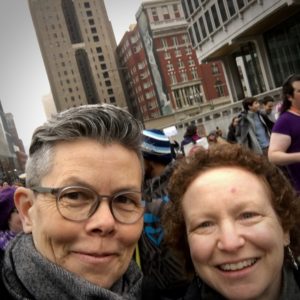
Of course the Women’s March with fellow Creating Change-goers on Saturday was hugely gratifying: I was swimming in a huge school of fierce, focussed activists, each of us veterans of anywhere from several to dozens to scores of marches, demonstrations, and direct actions. When we poured out of the hotel, I looked around and thought: What are the chances?! The Women’s March route goes right by the hotel! Until I realized: Oh. This is just us. Marching to the march, with blockaded blocks en route and everything (thank you Stacey Long Simmons for impeccable planning) Dana Rudolph, of Mombian fame, strolled alongside me, and we had a perfectly delightful and empowering time.
That March got lots of attention (as well it should have; long may it wave and its repercussions repercuss). What I want to note here though are the lessons I learned and the thoughts that occurred to me in the less dramatic but no less powerful hours spent inside the hotel, with all those seasoned and focussed activists. Below I’ve strung together a necklace of 25 anecdotes, observations, and inspirations, listed simply in the chronological order in which I experienced them.
1. The single most important thing to a room full of LGBTQ parent/activists from across the country was: community. By country mile.
2. My old internet chum Sandra Telep (aka West Philly Mama) reminded me of this super cool thing she’s done since her kids were little(r): Guerrilla Queer Playgroup. A bunch of queer parents mass together in a public place (playground, kids’ museum, what have you) and quasi-queerify it. This, fashioned after Guerrilla Queer Bar, a delightful direct action tactic from the Gay ‘90s, when we would clump up and basically take over an otherwise straight bar in a joyful, impossible-to-ignore manifestation of our queer-arse selves.
3. In spite of some of his significant political missteps (see link in #11 below), I do miss hearing quips from the Quip Queen, former Representative Barney Frank. Pennsylvania State Representative Brian Sims reminded us of one of his best ones: “If you don’t have a seat at the table, you’re probably on the menu.”
4. I was sitting in the same room as one of the co-founders of Black Lives Matter Houston, Ashton P. Woods. Just, wow.
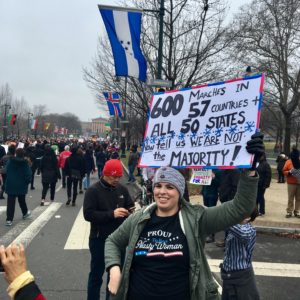
5. Ashton corrected someone at one point when discussion had turned to analyzing the recent political climate: “We’re not in disarray; we’re being silenced.”
6. Per Task Force Senior Strategist Sayre Reece: there are multiple avenues by which to effect change–direct service, the courts and legal paths, electoral politics, direct action, uprising, media, paid lobbying, grassroots lobbying–and they all entail taking some sort of risk. It’s just important to remember that they entail different risks, depending on where we’re situated on the multiple intersectional axes of power, and between these avenues the level of risk is quite different. There’s no sense in elevating one path as the path: we need enough of us taking them all of them, simultaneously, to get where we need to go.
7. Following from #6: there is absolutely no doubt that each of us who is alarmed by the destabilizing cryptofascism of Trump/Trumpism needs to reflect on what are our unique best tools with which effect change –which avenue is ours to take – and then we each need to try really hard to take that work many steps further, whatever that means for each of us. NOW IS THE TIME. It will never get more NOW than now.
8. Another shorter way to frame this, from Rea Carey’s lunchtime keynote: “If ever there were a time in your life to fight for something bigger than yourself, now is that time.”
9. Dr. Rachel Levine, Physician General for Pennsylvania, quoted Lin Manuel Miranda as having said it best in Hamilton: “To make a difference in any system, ‘You have to be in the room where it happens.’”
10. Dr. Levine, again: “If we don’t stand together, our opposition will chomp us up.” Chomp. Just marinate on that verb a bit.
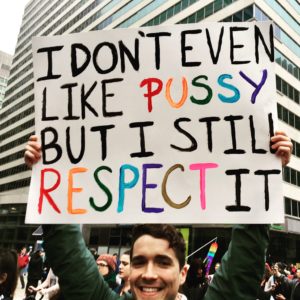
11. Invoking the way trans people were thrown under the proverbial bus during the Congressional fight for ENDA back in 2007, Florida State Representative Carlos Guillermo Smith (representing District 49: Orlando) took this notion up again later: “It’s more important now than ever to reject the notion that it’s better to take half a loaf of bread than no loaf.”
12. Rep. Brian Sims: “If you’ve got something that makes people pay attention, use it. But use it for something you will be proud about at the end of the day.”
13. Rep. Sims, in response to a question about the most effective lobbying tactics: “No amount of data can overcome the power of a personal story. Every one of us has a personal story, and we’re experts in that. You don’t have to be a polished public speaker: ‘um’ and ‘ah’ and other personalizing tics activate the human brain and stimulate folks to listen more.”
14. Phill Wilson, President and CEO of The Black AIDS Institute: “It is more important today than ever not to get distracted by the man behind the curtain.”
15. Following from #14: This notion is absolutely crucial for all of us to really, really internalize. Trump is expert at zippo regarding federal governance, of course, but we can all agree he is masterful at theatrics, at redirecting the media’s, and therefore most of our attention. It’s a devastating one-two punch: generate chaos and firehose-power doses of the appalling to distract us, and then accomplish the actual agenda offstage. Or even right in front of us, because we’re dazed and our attention is made powerless from the splintering. If we don’t get really good at catching and overriding this sleight-of-hand every time it happens, we will remain forever reactive, squandering precious time wandering down compelling Facebook-trails of Twitter insults, or shock-and-rage-inducing public pronouncements. There is an accident at the side of the road, no doubt, but it’s a hit-and-run, and our job is not to slow down and gawk at the wreckage, but to rapidly triage injury on site, and then take whatever action we can to keep the next one from happening (and the next, and the next).
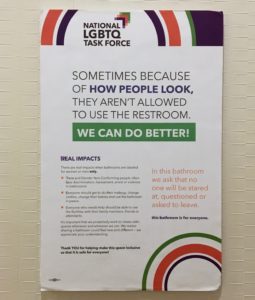
16. Phill Wilson, again: “I believe everything in life can be explained by a scene in The Wizard of Oz. For the past eight years, I felt as if we were watching the Wicked Witch of the West melt and disappear under the bucket of water Dorothy threw on her. Now I think we’re more like in the flying monkey scene. I don’t know about you, but that scene still scares the bejesus out of me. But you know what? I still have hope. Because I’ve seen this movie before. I know how the movie ends.”
17. Rea Carey, Executive Director of The Task Force: “We totally can do this. We’ve done it before; we know how. We don’t need to learn how to resist; we just need to tap into that knowledge.”
18. Rea Carey, again: “Our insistence on hope will be one of our most radical acts over the next four years.” AMEN SISTER. SIGN ME UP FOR THE RADICAL HOPE CHORUS.
19. And again: “There will be enormous pressure on us to divide ourselves.” See also item #11, from Rep. Carlos Guillermo Smith. Not dividing ourselves does not mean asking more marginalized folks to set aside their issues for what the more enfranchised regard as “winnable” fights. It means we all figure out how to thread each step forward through this filter: does this work help protect, support, and empower the most vulnerable among us?
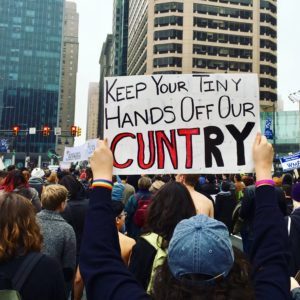
20. Candace Bond-Theriault, Policy Counsel for Reproductive Rights, Health and Justice at the Task Force, reminded folks: “There is such a thing as being too late. Remember Reconstruction. And what followed.” And she reminded us of Reverend William Barber’s keynote remarks from the night before: Trump wouldn’t exist in this way without Obama; every stride toward freedom has been met with a “whitelash.” What we are witnessing now is the birth of a Third Reconstruction.
21. Joshua Tom, Staff Attorney for the Mississippi ACLU: If you want a beautiful smorgasbord of argument and reasoning to defeat the arguments that “religious liberty” or “religious freedom” can be used to substantiate discriminatory practices, just read the opinion of Judge Carlton W. Reeves in his finding in Barber v. Bryant.
22. While this proposed MS law, HB 1523, is severe, copycat laws are being proposed all over the country and are going to be one of the primary means by which LGBTQ (and many other reproductive) rights are sought to be dismantled. What would the MS law have provided cover for? Single women could be denied birth control; school counselors could refuse to provide counseling about contraception to high schoolers; nursing homes could turn away an unmarried couple; schools could legally force a student who’s transgender to use the bathroom of their sex assigned at birth; foster parents would be legally protected if they wanted to force an LGBT child in their care into conversion therapy.
23. Notice anything interesting about that proposed law? Other than that the district court judge struck it down? Three out of five of those heinous things were draconian restrictions on unmarried heterosexual people with children seeking – anything – and others seeking contraception. From which one must draw the obvious conclusion: Coalition work with our allies is more necessary now than ever.

24. Five key take-homes from the Transform California campaign (of which my workplace was a member): (1) sharing stories is vital to building support; (2) our messengers must be as diverse as our communities; (3) bring your friends: be sure to telegraph that we do not live apart or in isolation from others; (4) it is critical to include in our stories models of acceptance, love, and support from members of those communities which have the most to learn (e.g., grandparents being loving to their trans grandkids, working class cis dads being loving and supportive of their lesbian daughters, etc.); (5) describe things like gender identity in the simplest possible way, bearing in mind that the folks we need to get to the most will be entering the conversation at a fairly basic level and are very much in need of that.
25. On my flight back, I was strapped in from Dallas to Oakland next to a verrrry chatty white, cisgendered, heterosexual, Christian, Republican man. I learned a lot, though probably not so much what he thought I might have learned (“Death by mansplaining,” it felt like for most of those miles). At times during those extremely long 2 hours and 55 minutes I felt like I was sacrificing more for the movement than I had in many a year. But I hope I left him with a morsel of something, my humanity and that of my family, not least. I can certainly say that he left me with the same: it will be a long time until I spend this much time in conversation with someone whose life experience is so different than mine (even if it was 80% him talking). I learned that his parents were so much more conservatively Christian than him that they hadn’t spoken to him for the past nine months since his divorce. I learned that he enrolled in the Army so as to get training that he could not afford to get any other way: college was out of the question. I learned that though he made it through multiple tours in Iraq alive, he ultimately feels that his life was beginning eight or more years after those of everyone else he compares himself to. I learned that this past election, neither he nor his parents voted. They couldn’t bring themselves to vote for Clinton, but neither could they vote for Trump (not a true conservative, and yes, too vulgar). I have no idea how to get through to folks like this–the only three things we agreed on were that (1) we were dedicated to remaining civil throughout the flight, (2) our children were the most valuable things in the world to us, and (3) neither of us were attracted to guys. But I would like to think that one step forward is my recognizing his humanity. It’s a start.
